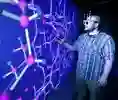




The skills, experience and technical expertise you’ll gain on a Computer Science degree at Hull put you in high demand when it’s time to enter the job market in this fast-moving industry.
Gain a rock-solid grounding in the fundamentals of computing, information science and informatics. Learn to problem solve using logical thinking. Develop programming and professional skills. Then choose from specialist modules to tailor your learning to the career you want.
About this course
Discover the rapidly evolving technological advances and exciting challenges of computer science on this British Computer Society accredited degree.2
Gain a thorough understanding of the computing essentials before choosing from specialist modules including advanced programming, computer vision and mixed reality development.
You’ll have access to the latest industry-standard equipment, including high-performance workstations, gigabit networking, 3D printers, robots, a 3D immersive cube, motion capture, AR, VR and MR.
Gain paid experience, build contacts and test your skills in the real world by taking a placement year with the likes of BT, BAE Systems, Microsoft or IBM. A recognised part of your degree, your placement gives you outstanding tech industry experience.
You’ll benefit from our strong links with companies like EA, Sony and Black Marble with frequent talks by experts in the trade. And you could compete in international events like the Microsoft Imagine Cup. Or rise to the challenge of creating a computer game over a weekend in our Three Thing Game.
You’ll leave as a well-rounded computer science graduate complete with a standout CV.
Immerse yourself in tomorrow’s world today.
Module options
Our five undergraduate Computer Science courses share the same compulsory modules in the first year. This gives you a foundation of knowledge across the whole subject area and the chance to explore what really interests you. You're then better placed to choose your modules in the later years of our BSc Computer Science, or switch to a different pathway to specialise in games programming, software engineering, robotics or AI.
Filters
Programming Portfolio
Gain the practical knowledge to design, implement and test algorithms. The module uses lectures to deliver concepts, a practice lab to apply the programming concepts learnt by developing programs to solve problems. You will take part in hands-on practical assessments, which will enable you to acquire extensive programming skills in an industry standard programming language. We will support you whether you are new to programming or have existing skills.
core
40 credits
Algorithms and Data Structures
Start to think like a computer (bleep bloop)! This module explores logic, data storage and algorithms with the use of practical demonstrations and activities. Operating in parallel with programming-focussed modules, we will develop a toolkit of key concepts from a theoretical (non-code) perspective, facilitating a better understanding of these fundamentals. Topics to expect include pseudocode, state machines, essential keywords, common data structures, sort algorithms and search algorithms. You will learn methods to analyse and compare algorithms and their constituent parts in order that you may better design, evaluate and develop effective, efficient and performant software solutions.
compulsory
20 credits
Computational Thinking
This module Computational thinking is essential for developing computer-based solutions. This module will enable you to develop your knowledge and understanding of the key mathematical underpinnings of computer science, to aid you in problem solving and programming. The development of your competence in logic, mathematics and statistics will also provide evidence of your numeracy and more advanced skills and is valued by employers.
compulsory
20 credits
Architectures, Operating Systems and the Cloud
In this module you will explore the fundamental properties of computers that allow them to execute programmes. You will learn about how Computers are made to work in hardware and simulation (Virtual Machines). A collection of Virtual Machines is a cloud, and this Module allows you to get experience with the development of your own cloud using appropriate platforms.
compulsory
20 credits
Professional Development
Employers want much more than discipline specific skills. This module sets you up to grow your professional skills and awareness, when working both individually and as part of a team. You will also develop your appreciation of the challenges within the sector, and how technology can help to solve worldwide issues. You will begin a personal portfolio that you will add to over your degree and you will work as part of a team to produce a design prototype, demonstrating your personal professional development. Through researching your discipline, you will understand the range of career roles available and what you need to do to progress in them.
compulsory
20 credits
Design, Develop, Deploy
Our flagship software development module. You'll use contemporary software development tool chains to experience authentic software creation and deployment, applying techniques such as agile project management, test-driven development and continuous integration and deployment.
core
40 credits
Artificial Intelligence
Data is one of the 21st century’s most valuable commodities. In this module you will learn how to analyse, validate and interpret it to inform decision making. You will implement artificial intelligence techniques to solve a real world problem. . Nationally, there is a widely recognised shortage of qualified Artificial Intelligence (AI) and data scientists to meet the needs of industry.
compulsory
20 credits
Advanced Programming
In this module you will explore advanced techniques in programming as well as building an understanding of how high level objected-oriented languages are executed on a modern CPU. C++ will be used extensively, but we with reflect back on C#, as well as throwing in some assembly language.
optional
20 credits
eXtended Reality Development
eXtended Reality is a blend of physical and virtual environments, unlocking natural and intuitive 3D human, computer, and environment interactions. You will learn concepts and techniques in the field of mixed reality and user-centred testing. You will implement eXtended Reality applications using technologies applicable to the problem domain and use an eXtended Reality application to conduct a user test, analyse and report on results.
optional
20 credits
Our facilities


Watchlist
BSc Computer Science
Course overview
1 min
MEng Computer Science
Course overview
2 mins
Rand Nessif
Unsame Stories
2 mins
See our incredible labs
Course Highlight
2 mins
Featured academics
You’ll be taught by talented researchers whose specialist areas include computational science; computer gamification; dependable intelligent systems; robotics and artificial intelligence; and simulation and visualisation.

Dr David Parker
Lecturer in Computer Science
David loves using software to solve problems and oversees many of our game jams and programming competitions such as the Three Thing Game and the Global Game Jam. His research focuses on improving characteristics of safety-critical systems.

Dr John Dixon
Lecturer in Computer Science
John is a computer science researcher, lecturer and software engineer and developer. He specialises in networking, connected services and distributed systems, C# and .NET. He’s developed mission-critical solutions for the fire and rescue services.
Entry Requirements
What do I need?
When it comes to applying to university, you'll need a certain number of UCAS points. Different qualifications and grades are worth a different amount of points. For this course, you'll need 112 UCAS points.
At least 80 points must come from A levels, BTEC, or other equivalent qualifications.
We consider experience and qualifications from the UK and worldwide which may not exactly match the combinations above.
But it's not just about the grades - we'll look at your whole application. We want to know what makes you tick, and about your previous experience, so make sure that you complete your personal statement.
Typical offer
112 UCAS points
A levels
BBC
BTEC
DMM
Fees & Funding
How much is it?
For UK students, our standard course fee is £9,535 per year. Keep in mind that some courses are longer - for example, spending your third year abroad will make your degree four years in total.
If you choose to study a foundation year as part of your course, the fee is £9,535.
Planning a year abroad? This costs £1,430 for UK students.
Thinking about a year in industry? This is £1,907 for UK students.
How do I pay for it?
You can take out a tuition fee loan to cover the full cost of your course. Once you’ve successfully applied for this, you don’t need to do anything else – the money is sent straight to us.
You can also take out a maintenance loan of up to £10,544 a year to cover your living costs, depending on your household income.
Remember, you won’t start paying your loans back until you’ve left university and earn more than £25,000 per year.
See our full fees and funding information for more details and to find out what support we can offer.
Standard Tuition Fee
£9,535 / year
The amount you pay may increase each year, in line with inflation - but capped to the Retail Price Index.

Future prospects
Want to create the next generation of software? Or develop apps or computer games for a living? Or set up your own tech business? You’ll open up all these careers and more with a Computer Science degree at Hull.
Graduate careers include computing, video games, teaching or the business, financial and public sectors. Many of our graduates go on to work for industry giants such as Sony, Microsoft, Electronic Arts, Rockstar Games, Dell, Fujitsu and Capita as well as not-for-profit businesses and public sector organisations. Some move on to further study with an MSc or PhD. And some have gone on to set up and grow their own tech businesses.
Become part of the next generation of futuremakers
Like what you've seen? Then it's time to apply.
The standard way is to apply through UCAS. This will give you the chance to showcase your skills qualities and passion for the subject, as well as providing us with your academic qualifications.
Not ready to apply yet?
Visit our next Open Day, and see all that Hull has to offer for yourself. Talk to our lecturers about your subject, find out what university is really like from our current students, and take a tour of our beautiful campus and amazing facilities.
You may also be interested in...
Computer Science is ranked number 7th in the UK (HEIs) for student voice. National Student Survey (NSS) 2025, HEIs only.
Accredited by BCS, The Chartered Institute for IT, for the purposes of fully meeting the academic requirement for registration as a Chartered IT Professional, and partially meeting the academic requirement for a Chartered Engineer (for MEng, fully meeting the requirement for a Chartered Engineer).
90% employability (Computer Science) UK domicile full-time first degree leavers; Higher Education Graduate Outcomes statistics, for the academic year 2022/23, published by the Higher Education Statistics Agency June 2025.
All modules presented on this course page are subject to availability and this list may change at any time.